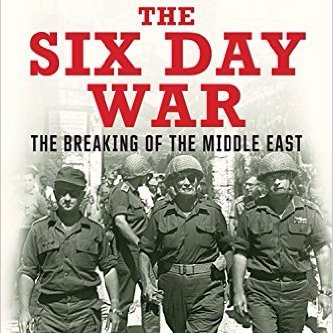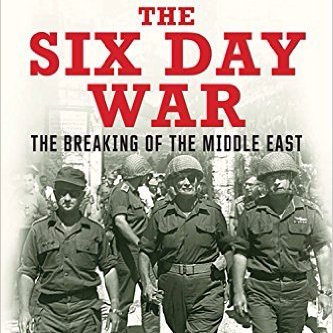By Guy Laron | (Informed Comment) | – –
An American President enters office after his progressive predecessor courted a major Middle Eastern country. The new president is not satisfied with what he perceives as a wishy-washy approach to foreign policy. He throws the emphasis on humanitarian aid out of the window. A hard-nosed businessman representing the interests of the heartland, he vows to put American interests first and those of the rest of the world second. He believes that the U.S. should strengthen its ties with its traditional allies in the Middle East: Saudi-Arabia and Israel.

Guy Laron, The Six-Day War: The Breaking of the Middle East
Defiance of American interests will be punished, he warns. Sounds like the current transition from the Obama administration to Trump’s? True. But this description also fits what happened when Lyndon Johnson replaced John Kennedy in the White House. We can’t know for certain what would be the consequences of Trump’s emerging policy in the Middle East. However, we do know what was the end-result of LBJ’s policy shift in the Middle East: A war so devastating that its legacy still poisons the fabric of relations in the region today. The history of U.S. involvement in the Middle East during the 1960s should serve as a warning sign.
Same as Obama, Kennedy believed in reaching out to those that express hostility toward the U.S. and reasoning with them. Putting money in the pockets of Third World Leaders seemed to Kennedy like a good way to cultivate good will towards America. The U.S.’s foreign aid budget grew dramatically under Kennedy. Looking at the Middle East, and the wars that tore it apart, made Kennedy declare that the region needed less bombs and more tractors.
Same as Obama, Kennedy made a bold move by reaching out to a regional hegemon that criticized Washington sharply. Gamal Abd al-Nasser’s Egypt strived to lead the Arab world in the same way that Iran today wants to unite the region’s Shias. Rather than confront Nasser, Kennedy made a bold move. He offered Nasser subsidized wheat to the tune of $400 million. The result? Nasser promised to put the Arab-Israeli conflict ‘in the ice box’ and honored his commitment. The Egyptian dictator also moderated his anti-American rhetoric considerably.
When Kennedy was assassinated in November 1963, Lyndon Johnson entered the White House with a new doctrine. He was not only a veteran politician but also a wealthy businessman who built a small media empire In Texas, his home state, using political connections. Johnson deemed bribing America’s detractors into cooperation wasteful and ineffectual. If Third World leaders wanted to get something from the U.S. they had to exhibit their loyalty. Johnson was not enamored with the idea of giving subsidized wheat to developing countries and believed that Nasser was a regional bully. By 1966 he completely closed the spigot of American economic aid to Egypt.
While Johnson was stingy with economic aid, he was generous with regard to weapons. During his first four years in office he authorized numerous arms deals with what he saw as Washington’s natural allies in the Middle East – Israel, Turkey, Jordan, Saudi-Arabia and Iran. While Kennedy sent to the Middle East wheat to the tune of $400 million, Johnson sent $800 million worth of weapons. The result? An increasingly confident Israel took tough measures against its neighbors, Jordan and Syria. Nasser, losing popularity at home due to a harsh recession, escalated his anti-Israel and anti-American rhetoric and vowed to help his Arab brothers. This dynamic led to the 1967 June War in which Israel clashed with an Arab military coalition. It was during this war that Israel conquered the West Bank and the Gaza Strip and started an occupation that continues until this very day.
Donald Trump and his advisors are now following the footsteps of the famous Texan. While Johnson placed weapons in the hands of Israel and Iran in the name of an anti-Communist crusade, Trump suggests bolstering Israel in the name of a global war against ‘radical Islam’ (Trump’s alter-ego Stephen Bannon speaks about ‘fascist Islam’). A recent announcement from the White House created a precedent by maintaining that existing Israeli settlements in the West bank are not an obstacle to peace (for 40 years various administrations maintained the opposite).
Trump thinks badly of Obama’s rapprochement with Iran and vowed to undo the Iran deal. His National Security advisor recently put Iran ‘on notice’ for conducting a missile test. As a result, Iran’s enemies, such as Saudi-Arabia and the Gulf States are looking forward to work with Trump’s administration. The President, on his part, has already signaled that he would preserve the alliance with Riyadh. Trump’s ban of refugees from Muslim countries, overturning Obama’s decision to admit thousands of them, creates a lot of ill-will in the Middle East. In short, there are a number of ticking time-bombs in the Middle East and the most explosive are the Israeli-Palestinian conflict and the rivalry between Saudi- Arabia and Iran. It’s easy to see how Trump’s policies will bring about their detonation and create a mayhem as worse as the one that afflicted the region in 1967.
Guy Laron is a Senior Lecturer in the International Relations Department of the Hebrew University. He is the author of
The Six-Day War: The Breaking of the Middle East (Yale University Press, 2017), to be published later this month.



 © 2025 All Rights Reserved
© 2025 All Rights Reserved